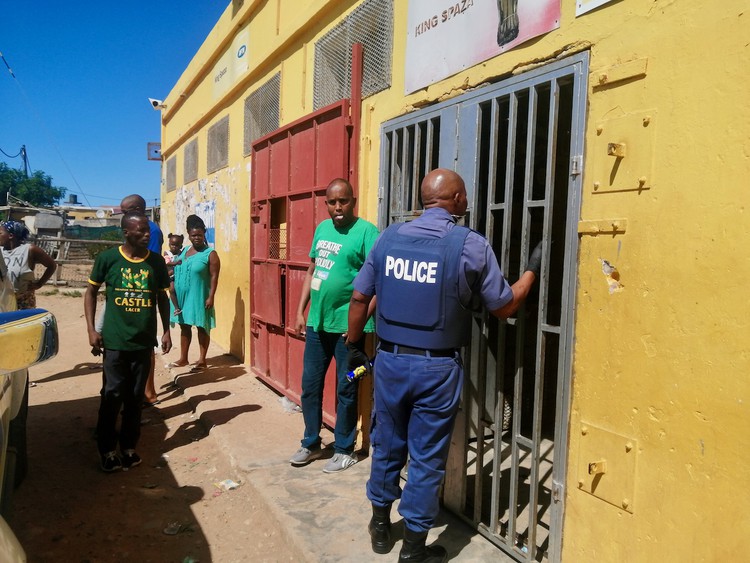Covid-19: Police shut immigrant-owned spaza shops after Minister’s xenophobic statement
Open shops for us to buy locally and obey lockdown, say township residents
Police shut down immigrant-owned spaza shops early on Friday morning in Govan Mbeki, Port Elizabeth, citing the 21-day national lockdown to mitigate the spread of Covid-19.
The spaza shop owners were confused and scared. They complied, but after the police left, residents demanded they reopen their shops.
Then mid-morning, police returned. Mohamed Surat of Enjeni Spaza shop said he was pepper-sprayed by police who pushed people out of his shop while their goods and money were still on the counter.
Abdukadir Mohamud of the King Spaza said: “Six police vehicles from KwaDwesi Police Station arrived early in the morning and ordered me to close my shop. I showed them my municipal registration certificate. But their captain told me I am not even a South African. I should close down my shop.”
“After they left the community ordered me to reopen. I reopened and the police came back again before noon. They ordered everybody to get out. The shoppers confronted them. But the cops did not listen. They just pepper sprayed them. Twenty-one shops here in Govan Mbeki Township have been closed by the police,” he said. “But residents are just forcing us to continue trading after the police have left. And we are still operating in fear of our stock being looted if we don’t listen to the residents.”
Hours before the lockdown Minister of Justice Ronald Lamola said spaza shops will remain open in order for the people to buy food at the nearest shops. People should only go further afield if they cannot get what they need. The idea was to have as little movement as possible, Lamola had said.
But the Minister of Small Business Development Khumbudzo Ntshavheni said at the ministerial briefing on the lockdown this week that strictly only South African owned and operated spaza shops would be allowed to trade. She said: “We want to make sure that the quality of food and surety of the quality of products is there.”
Then on Wednesday, Business Insider, seeking clarity was told by the ministry that only spaza shops with municipal licences will be allowed to trade.
Asked for comment, national police spokespersons Brigadier Vishnu Naidoo added to the confusion: “The Regulation makes reference to supermarkets, and spaza shops are not supermarkets.” Naidoo did not comment further.
Phakamisa Gaga, who has a physical disability, was inside the King Spaza shop when police arrived. “I was busy buying bread when police ordered us to get out. I asked them whose orders they were following because the minister explained it clearly that all the legal spaza shops will remain open.
“But the stupid police just pepper sprayed me in my eyes. What they are doing is wrong. We can’t be locked down when we are hungry.”
Resident Mhleli Nenene said: “Yesterday, there were long queues in town and we could not buy groceries. We depend on these spaza shops. Some of us don’t have taxi fare or vehicles to go to town. Even there it is not safe because of the long queues in those big supermarkets … We say to the spaza shop owners, open up the shops in order for us to buy and obey the lockdown.”
Another resident Yolanda Metele said: ”The police are pushing us. We are behaving and obeying the lockdown. But we won’t allow our shops to be shut down by the police. We told the spaza shop owners to open and let the police deal with us. There is no need for violence and shutting down of the spaza shops.”
Said Mohamud, provincial chairperson of the Somali Community Association, said: “We went to the police station commanders but they say they are also confused because they were given instructions by the minister of small business to shut down all the foreign owned spaza shops. But what we understand is that only unregistered spaza shops without municipal certificates are not allowed to operate.”
“We told them that the buildings were owned by South African landlords and we are just the tenants. We even told them that we were helping communities by bringing the services close to them. But they said they will arrest us if we don’t close our shops.”
On Friday afternoon police returned a third time and shut all immigrant-owned spaza shops.
Support independent journalism
Donate using Payfast

Don't miss out on the latest news
We respect your privacy, and promise we won't spam you.
Next: In photos: Day one of lockdown
Previous: Covid-19: Here’s a possible source of funds for social grants
© 2020 GroundUp.
This article is licensed under a Creative Commons Attribution-NoDerivatives 4.0 International License.
You may republish this article, so long as you credit the authors and GroundUp, and do not change the text. Please include a link back to the original article.

